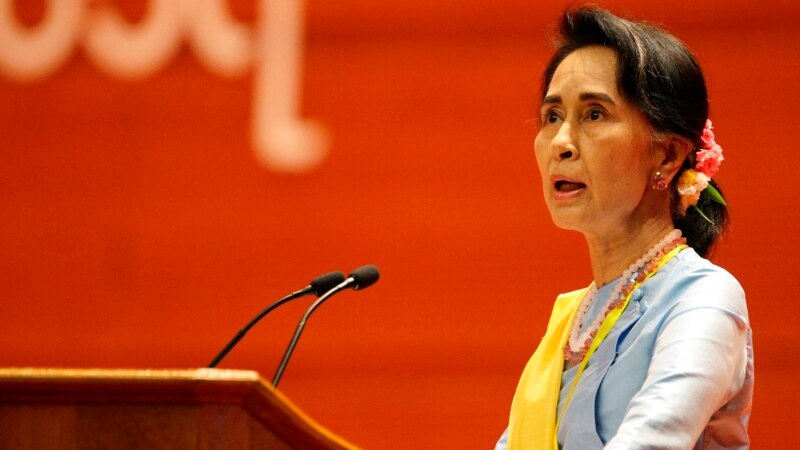In Suu Kyi's Myanmar, Concern Rises Over Press Freedom

In the old, military-ruled Myanmar, it would not have been a surprising scene: three journalists, bound together in chains, raising shackled hands in unison and speaking out against their repressive government.
But this moment, captured on video by a local news organization, the Democratic Voice of Burma, was not from another era. It was recorded Tuesday, and it underscores how little has changed in the Southeast Asian country since the party led by Nobel Peace Prize laureate and longtime opposition leader Aung San Suu Kyi won elections a year and a half ago.
“Just look at these chains. This is what we get for being journalists,†said Lawi Weng, one of three reporters detained by the military on June 26 for covering a drug-burning ceremony organized by an ethnic rebel group in the northeast.
“How can we say this is democracy?†Weng asked before entering a police van headed back to jail after a brief court hearing in Shan state's Hsipaw township.
The reporters each face three years in prison for violating the nation's Unlawful Associations Act, which was designed to punish people who associate with or assist “illegal†groups - in this case, the Ta'ang National Liberation Army, one of more than a dozen small rebel armies that control patches of territory in the north and east. The rebels burned a cache of narcotics to mark the United Nations' International Day Against Drug Abuse.
Members of various rebel groups, along with their sympathizers and some aid workers, have been prosecuted under the Unlawful Associations Act. But rarely, if ever, have journalists - many of whom travel regularly to zones controlled by the Ta'ang and other insurgent groups.
It's unclear why these journalists were singled out. Suu Kyi's government, which is struggling to broker a nationwide cease-fire with the country's rebel armies, simply says they broke the law and should have informed security forces before visiting a conflict zone.
The arrests, combined with the prosecution of critics who have spoken out against the nation's military and civilian authorities, have surprised many who thought Suu Kyi's rise would herald a new era of freedom of expression.
Suu Kyi spent nearly 15 years under house arrest during the nation's long era of military rule, and she was praised worldwide for leading the struggle for democracy. Although her administration is officially in charge, the military still wields most power.
Shawn Crispin, Southeast Asia representative of the Committee to Protect Journalists, said Suu Kyi's administration continues to use “antiquated laws to threaten and imprison journalists.â€
“Reporters are still being targeted for reprisals and imprisoned for their reporting,†Crispin said. “Frankly, that's not what we thought an Aung San Suu Kyi-led government would condone or promote. It's been massively disappointing.â€
The New York-based press freedom group, which has called for the reporters to be released, had hoped the administration would “prioritize amending or scrapping these draconian provisions,†Crispin said. “To our dismay, they've chosen to use them to suppress criticism instead.â€
Since Suu Kyi's party swept elections in November 2015, at least 67 lawsuits have been filed under the controversial Telecommunications Law, which had been employed by the former military governments to punish dissent and prosecute those who took part in the pro-democracy struggle.
The law targets anyone “extorting, coercing, restraining, wrongfully defaming, disturbing, causing undue influence or threatening to any person.â€
At least a dozen people have been charged so far, according to the Telecom-Law Research Team, an independent research group. Several suits have involved alleged insults against Suu Kyi, among them a woman now serving a six-month jail term for criticizing her on social media.
In addition to Lawi Weng, who works for the Irrawaddy media outlet, the two other journalists detained after crossing into rebel territory in Shan state are Aye Nai and Pyae Bone Naing, both from the Democratic Voice of Burma.
Their court appearances have repeatedly been changed without notice, fueling speculation authorities want to minimize media coverage.
Charles Santiago, a Malaysian lawmaker who chairs the ASEAN Parliamentarians for Human Rights, said that “covering developments in conflict areas is already dangerous work.â€
“Journalists shouldn't have to add to their list of worries the possibility that the military might imprison them based on a century-old law that clearly wasn't intended to apply to them and should have been repealed altogether long ago,†he said.
Speaking after their court appearance Tuesday, journalist Aye Nai said Democratic Voice of Burma reporters had traveled repeatedly to other rebel zones controlled by insurgent groups like the Kachin, the Karen and other minorities fighting for greater autonomy.
They had not been charged before, and should not be now, he said.
The government has reached provisional cease-fires with many of the rebel groups. The Ta'ang are among several still fighting, however, along with allies Kachin Independence Army and the Shan State Army-South.
“The government that was elected by the people should ... amend these laws,†Aye Nai said. And even though they have detained us, “the belief we have in media will never fade away. We (will) do our job.â€

0 Response to "In Suu Kyi's Myanmar, Concern Rises Over Press Freedom"
Posting Komentar